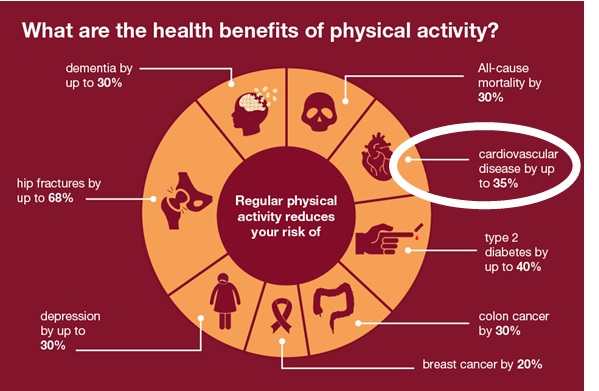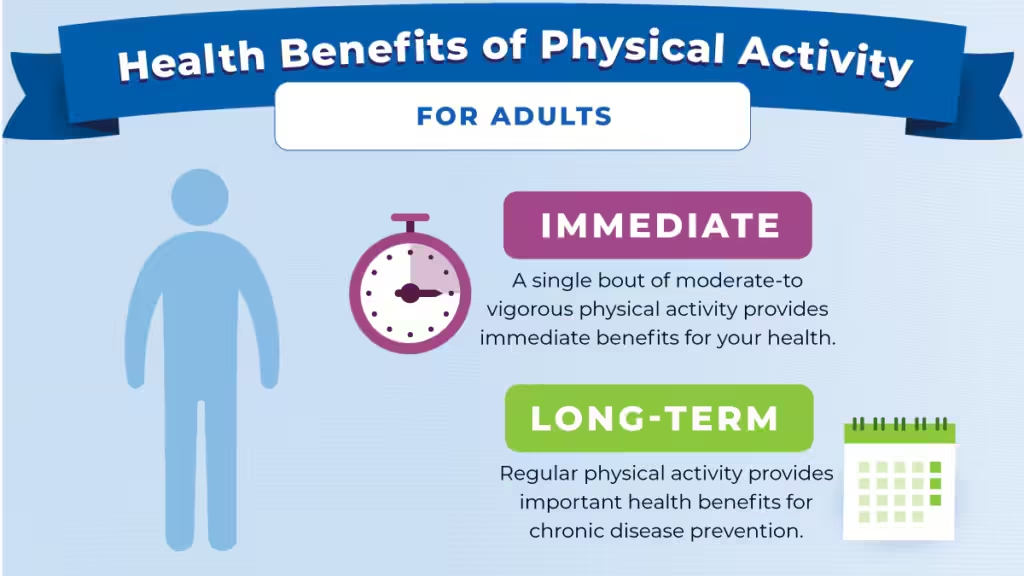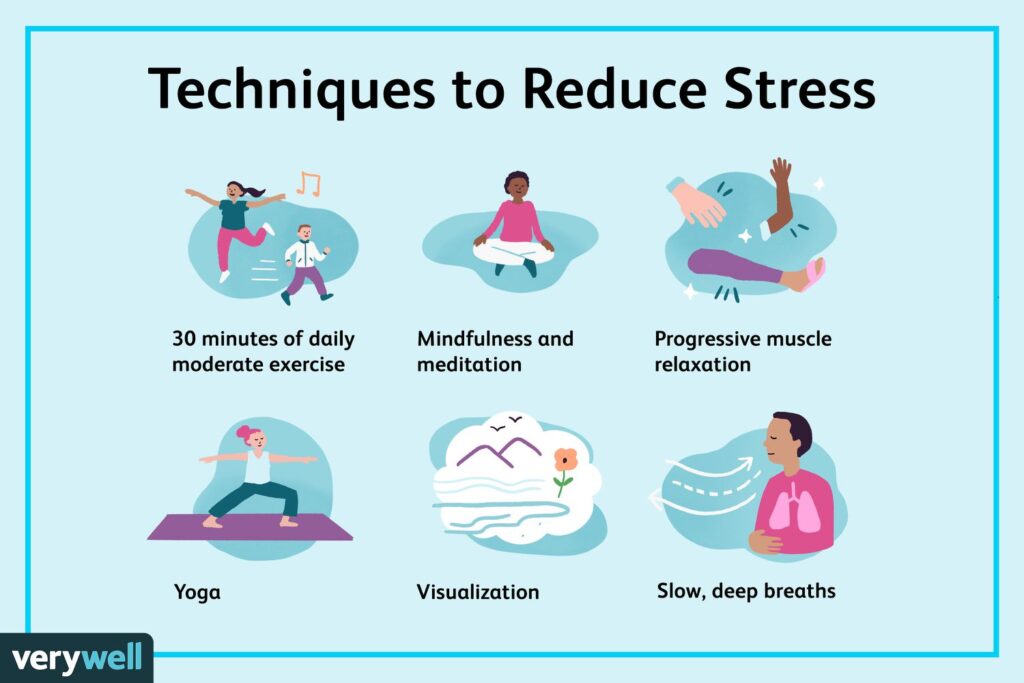Physical activity is crucial for overall health, boosting heart health, managing weight, and reducing chronic disease risk.
Below, we delve deeper into why physical activity is essential and how it impacts various aspects of our lives.
Improves Cardiovascular Health:

One of the most significant impacts of physical activity is its role in maintaining and improving heart health. Aerobic exercises such as running, swimming, cycling, and even brisk walking play a vital role in improving cardiovascular health. Here’s how:
- Strengthens the heart muscle: Regular physical activity helps make the heart stronger, so it can pump more blood with each beat. This improves circulation, ensuring that oxygen and essential nutrients are delivered efficiently to organs and tissues.
- Lowers blood pressure: Exercise helps reduce the stiffness of arteries, which in turn reduces blood pressure. Individuals who engage in regular physical activity are more likely to maintain healthy blood pressure levels, significantly reducing the risk of hypertension and associated health complications.
- Improves cholesterol levels: Regular exercise can reduce bad LDL cholesterol and increase good HDL cholesterol. This balance is crucial for preventing plaque buildup in the arteries, reducing the risk of coronary artery disease and heart attacks.
- Reduces risk of heart disease and stroke: With improved circulation and a stronger heart, the risk of developing cardiovascular diseases such as heart attacks and stroke is greatly diminished.
Aids in Weight Management:
Maintaining a healthy weight is key to overall wellness, and physical activity is central to weight management:
- Burns calories: Every time you move, your body burns calories. The higher the intensity of the activity, the more calories your body burns. Physical activity helps prevent weight gain and contributes to weight loss by burning excess calories and stored fat.
- Promotes muscle mass maintenance: Physical activity, particularly strength training exercises, helps build and maintain muscle mass. Muscle tissue burns more calories than fat, even at rest, so having more muscle mass can boost your metabolism and make it easier to manage your weight over time.
- Prevents obesity: Obesity is a major risk factor for numerous chronic conditions, including type 2 diabetes, cardiovascular disease, and certain types of cancer. Regular exercise helps prevent excess fat accumulation and supports long-term weight maintenance.
Boosts Mental Health and Mood:
Physical activity is often referred to as a “natural antidepressant” because of its profound effects on mental well-being. Engaging in regular exercise has a significant positive impact on mood, mental clarity, and emotional health.
- Releases endorphins: When you exercise, your brain releases endorphins, which are natural chemicals that make you feel good. These “feel-good” hormones are responsible for the sense of well-being and happiness that many people experience after a workout. Endorphins play a key role in reducing stress, anxiety, and symptoms of depression.
- Enhances cognitive function: Physical activity increases blood flow to the brain, which improves cognitive functions like memory, focus, and decision-making. Exercise has been linked to better learning and productivity, and regular physical activity can help prevent age-related cognitive decline.
- Increases serotonin and dopamine: Regular exercise increases levels of neurotransmitters such as serotonin and dopamine, which play key roles in mood regulation, sleep patterns, and motivation. People who engage in regular physical activity often experience reduced symptoms of anxiety and depression.
- Improves sleep quality: A consistent exercise routine has been shown to help people fall asleep faster and enjoy deeper, more restful sleep. Exercise promotes relaxation and reduces the likelihood of experiencing insomnia. However, it’s important to avoid vigorous exercise close to bedtime, as it may temporarily increase energy levels and interfere with sleep.
Also Read: Can A New Engine Fit Ona A 06 Drz – Engine Compatibility Guide!
Enhances Bone and Muscle Strength:
Physical activity plays a critical role in building and maintaining strong bones and muscles, especially as we age. Strong bones and muscles are essential for mobility, balance, and preventing injuries:
- Increases bone density: Weight-bearing exercises such as walking, jogging, and resistance training help strengthen bones by stimulating bone growth and increasing bone density. This is particularly important as we age because bones naturally lose density over time, leading to an increased risk of osteoporosis and fractures.
- Strengthens muscles: Strength training exercises such as lifting weights, using resistance bands, or body-weight exercises like squats and push-ups help build muscle mass. Strong muscles not only improve overall physical strength but also support joint health and help with balance and coordination.
- Prevents falls and injuries: Improved muscle strength and coordination reduce the risk of falls, which are a leading cause of injury among older adults. Physical activity also improves flexibility and balance, helping you move more efficiently and avoid accidents.
Increases Longevity and Reduces the Risk of Chronic Diseases:

One of the most compelling reasons to incorporate physical activity into your life is its impact on longevity and the prevention of chronic diseases:
- Reduces the risk of chronic diseases: Regular physical activity helps regulate blood sugar levels, lowers blood pressure, and reduces inflammation, all of which contribute to a lower risk of developing chronic conditions such as type 2 diabetes, hypertension, and certain cancers (especially colon and breast cancer).
- Increases life expectancy: Numerous studies have shown that physically active individuals live longer, healthier lives. Regular exercise is associated with reduced mortality rates, largely due to its protective effects against heart disease, stroke, and other major health conditions.
Improves Sleep Quality:
A good night’s sleep is essential for overall health and well-being, and physical activity has a profound impact on improving sleep quality:
- Fall asleep faster: People who engage in regular exercise typically fall asleep more quickly and experience fewer disruptions during the night. This is due to the positive effects that exercise has on stress reduction and the regulation of sleep hormones like melatonin.
- Enhances sleep depth and duration: Engaging in physical activity, particularly aerobic exercises like walking, cycling, and swimming, helps deepen the sleep cycle. This means you spend more time in the restorative stages of sleep, waking up feeling more refreshed.
- Reduces insomnia symptoms: Regular physical activity has been shown to improve the symptoms of insomnia, particularly for people with sleep disorders. However, it’s essential to be mindful of the timing of your workouts, as vigorous activity late in the evening can make it harder to fall asleep.
Promotes Brain Health and Cognitive Function:
Physical activity doesn’t just benefit your body—it also significantly boosts brain health:
- Improves cognitive function: Regular exercise increases blood flow to the brain, which supports brain function and health. Physical activity has been shown to enhance memory, focus, problem-solving skills, and decision-making abilities.
- Reduces the risk of cognitive decline: As we age, our risk of cognitive decline, including diseases like Alzheimer’s and dementia, increases. Regular physical activity helps prevent or delay cognitive decline by promoting brain plasticity and the growth of new neurons.
- Boosts mental sharpness: Staying active can improve mental clarity and alertness. Even moderate exercise has been shown to boost energy levels and increase concentration, making it easier to stay focused and productive throughout the day.
Also Read: How Does Pilot Fit in Type 303 Suit – Pilot Flight Suit Guide!
Boosts Immune System Function:
Regular physical activity can strengthen the immune system and enhance the body’s ability to fight off infections and diseases:
- Improves immune response: Moderate exercise boosts the circulation of immune cells in the body, enhancing their ability to detect and respond to pathogens. This can lead to a more effective immune response, helping the body fight off illnesses like colds and infections.
- Reduces inflammation: Physical activity reduces chronic inflammation in the body, which is linked to a variety of diseases, including heart disease and cancer. Exercise helps regulate immune responses and keeps inflammation in check.
Reduces Stress and Promotes Relaxation:

In a world full of stressors, physical activity is one of the most effective ways to manage stress and promote relaxation:
- Lowers cortisol levels: Exercise helps reduce levels of cortisol, the body’s primary stress hormone. Lower cortisol levels lead to a calmer, more relaxed state of mind and body.
- Provides a mental break: Engaging in physical activities allows you to step away from the stresses of daily life and focus on something different. This mental break can provide a fresh perspective and help clear your mind.
- Yoga and stretching for relaxation: Practices like yoga and stretching exercises can be particularly beneficial for relaxation. They promote mindfulness, flexibility, and deep breathing, which can reduce tension and foster a sense of calm.
Increases Energy Levels:
Contrary to what you might expect, regular physical activity actually increases energy levels, making daily tasks feel easier:
- Boosts endurance: Over time, physical activity increases your stamina and endurance. Regular exercise helps your body become more efficient at using oxygen, which means you’ll have more energy to tackle day-to-day activities.
- Reduces feelings of fatigue: People who engage in regular physical activity often report feeling less fatigued and more energized throughout the day. Exercise enhances the flow of oxygen and nutrients to your muscles and tissues, keeping you feeling more alert and active.
FAQ’s
1. How does physical activity improve heart health?
Regular physical activity strengthens the heart, lowers blood pressure, improves cholesterol levels, and reduces the risk of heart disease and stroke.
2. Can exercise help with weight management?
Yes, exercise burns calories, helps maintain muscle mass, and prevents excess weight gain, aiding in long-term weight management.
3. Does physical activity improve mental health?
Yes, physical activity releases endorphins that improve mood, reduce stress, and boost cognitive function, helping to alleviate anxiety and depression.
4. How does exercise benefit bones and muscles?
Exercise increases bone density, builds muscle strength, and enhances balance, reducing the risk of osteoporosis, falls, and injuries.
5. Can physical activity boost immune system function?
Yes, regular exercise improves immune response, reduces inflammation, and enhances the body’s ability to fight infections.
Conclusion
In conclusion, physical activity is essential for overall health, offering benefits that extend from improved cardiovascular health to better mental well-being. It helps maintain a healthy weight, strengthens bones and muscles, and significantly reduces the risk of chronic diseases. By integrating regular exercise into your routine, you can enhance your longevity, boost energy levels, and improve your quality of life.